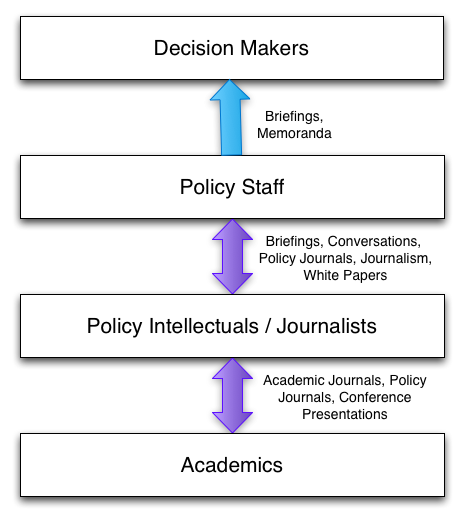This was a typically good post by Bill Gardner on a topic near and dear to my heart. At issue is what it takes to get academics and other subject-matter experts to communicate effectively their knowledge of research in their field–let’s say health–to decision makers. Doing just that is what TIE is all about.
Bill makes two good points. The first is that the distance between academics and decision makers is great in the sense that the message must diffuse through many social/media strata. The second is that we speak different native languages. He illustrates these points with a chart.
You can tell by the chart that decision makers are not paying direct attention to academics, nor reading what they typically write. There are a lot of filters between my peer-reviewed publication on Medicare Part D, say, and Senator X’s proposed reform of the program. How can academics help bridge this divide?
If you believe Bill’s chart, academics need to communicate effectively to policy intellectuals and journalists. That’s the way up the ladder. Bill’s idea is that we need more publications that “have as many as possible of the following attributes” (paraphrased from Bill’s list):
- Concise, data-driven, and policy-relevant content
- Good editing
- Peer reviewed
- Diversity of authors and readers
- Social media marketing
- Not the creature of a provider guild or the health industry
To these, I’d add “timely.” Therefore, I would also rethink one of these items: peer-review (#3). To be sure, it’s a crucial element of primary publication of research results. But it takes a long time. Inserting it into a translational, dissemination process risks missing the window of opportunity for maximum impact and utility. Timing is everything. (Well, wording counts too.)
If one is writing based on the existing body of research (which is loaded with policy relevant content that should be resurrected, even if originally published months to years before the issue made page A1 of the NYT), one need not peer-review the second telling. What keeps the re-teller “honest” is the need to protect and enhance her reputation and that of her institution. The same is true if she is speaking directly to a journalist. We don’t peer review that, though a good journalist might cross-check it with another expert.
My version of Bill’s must-have list is shorter: fast, accessible, knowledgeable, relevant, credible. With those, the rest will follow. Success is commensurate with marketing, but if the content satisfies those five criteria, it won’t take much to get the ball rolling.



